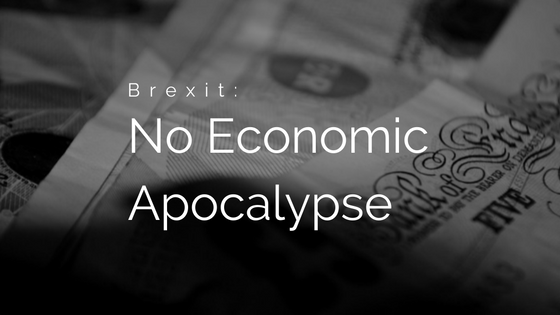Two and a half months on from perhaps the most momentous vote taken in over 40 years, the British economy, despite apocalyptic predictions from almost all financial institutions, still stands strong. The much talked about economic collapse has not happened.
So where are we now?
Calm after initial jitters
As expected, financial markets around the world dropped then recovered on the news that the UK voted to leave the EU. All major markets are now well above post-Brexit drops and many are at all time highs.
It was the Pound however that took a more tangible dip in fortunes. It dropped by the most in decades on the news. It has now stabilized in the £1.30 – £1.33 range against the Dollar.
On the manufacturing front confidence and activity took a steep drop in July following on from the vote. Companies seemed to hit the pause button to assess the lay of the land before moving forward. They did, and recent figures released show that August saw the biggest rise in activity for 25 years. The PMI index rose from 48.3 in July to 53.3 in August, a five point move. Anything above 50 indicated industry expansion.
So after some initial nerves, I think sense has prevailed and much of the economy and those who run it understand that nothing has actually changed at this present time, and that the best thing to do is to continue unabated in the pursuit of growth.
Housing
One of the biggest sectors within the wider UK economy is housing. Our country is obsessed with home ownership. That is why it plays such a major role in our economy.
Prior to the referendum, it was predicted that a vote to leave would send prices crashing. This has not happened. Not even close. Most major lenders are seeing prices continue to hold steady or rise. Only the very luxury end of the housing in market in London has seen a slow down. But the national pictures shows a stable housing market.
Currency – Sterling
Before the vote, the Pound was above £1.50 to the Dollar. After, it dropped by the most in decades, reaching a low of £1.27. It has since recovered slightly and right now stands at £1.33 to the greenback.
This has positive and negative consequences. For example, companies here buying their goods from abroad in the Dollar have found their costs increase. In our industry, there has been a split between companies who have chosen to pass that on or absorb it. Those who have chosen to absorb it are now finding new customers coming on board, moving away from suppliers who have chosen to pass on some rather hefty price increases.
There are though quite a few positives to this. On the business front, companies based here but make their profits in Dollars are going to find the value of their profits rise. Never a bad thing. It is also cheaper for tourists to come to Britain, and the most recent reports show a very strong rise in tourists from all over the world coming over and spending their hard earned cash. Foreign investment is now cheaper and there has been a boost in companies abroad investing in the UK. Lastly, manufacturers have seen a huge rise in the number of purchases from overseas as the cheaper Pound has attracted more interest in the things we make and export.
Money still to be made
There is a stack of positive economic data starting to gather now, and it’s starting to make all the predictions of doom and gloom look rather stupid. That’s not to say we’re out of the woods risk wise. Even if we continue to do OK, there are problems in Italy with their economy and their own referendum which could derail the European project. We cannot be sheltered from those effects. Another financial system shock could send everyone down the pan.
But whilst things are still OK here, all businesses need to make the most of the decent trading conditions and grow and be as profitable as possible. The better businesses and forward thinkers will already be using the new market conditions to their advantage, and the rest should be taking note of what they’re doing.
It may not be until 2019 until the UK leaves the EU, but until, there is still plenty to be positive about.
To get weekly updates from DGB sent to your inbox, enter your email address in the space below to subscribe:





